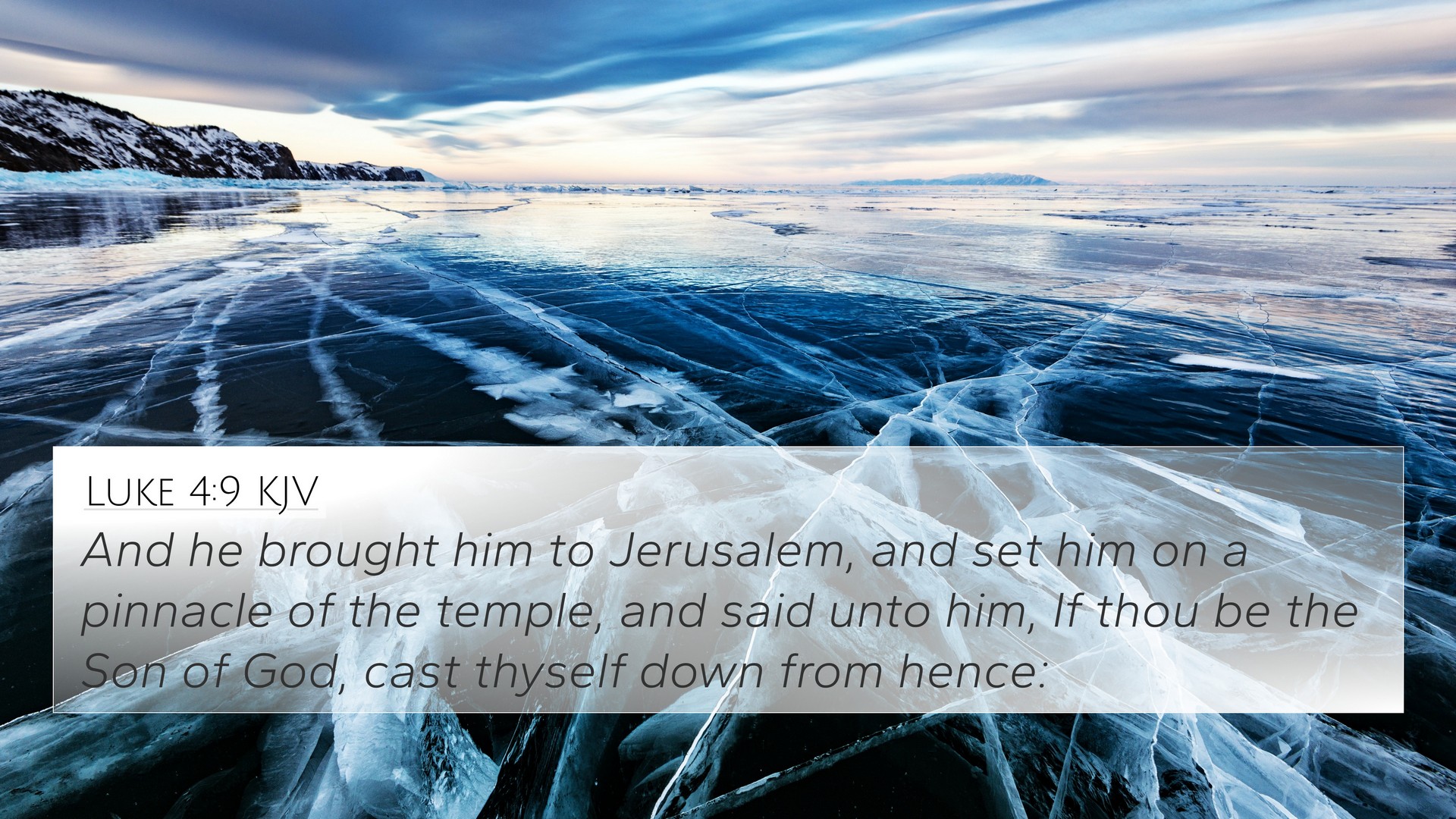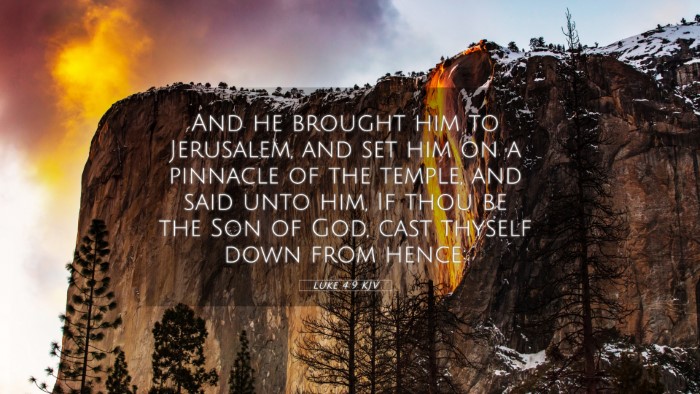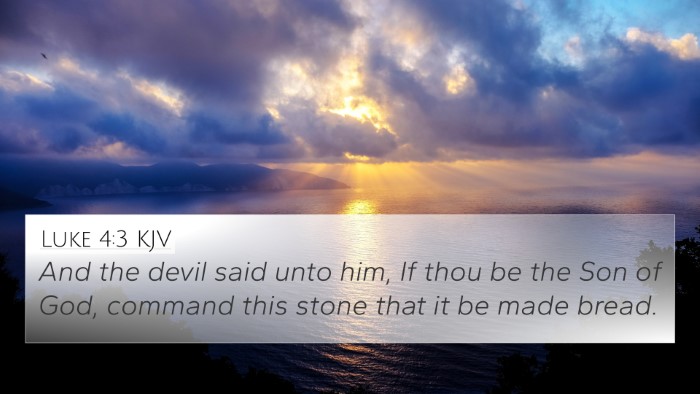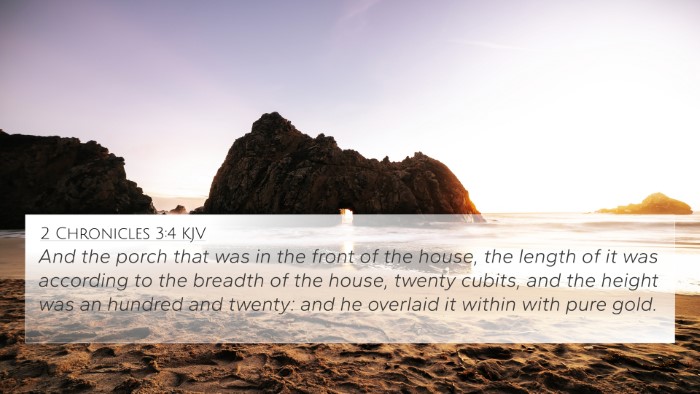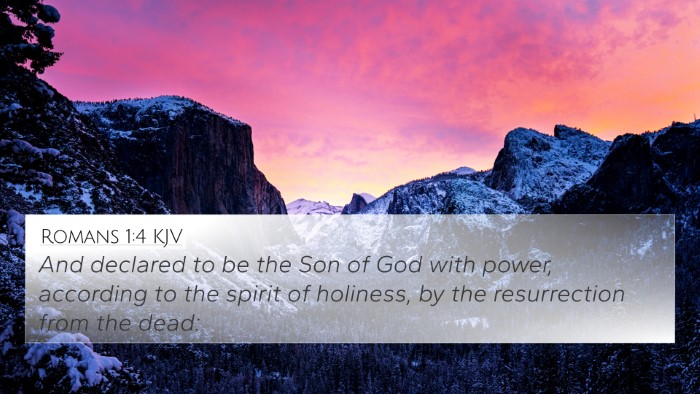Understanding Luke 4:9
Bible Verse: "And he brought him to Jerusalem, and set him on a pinnacle of the temple, and said unto him, If thou be the Son of God, cast thyself down from hence." - Luke 4:9
In this passage, we witness a significant moment during the temptation of Jesus. The devil seeks to test Jesus' identity as the Son of God by challenging Him to throw Himself down from the pinnacle of the temple, appealing to both His divinity and the promises of divine protection.
Commentary Insights
- Matthew Henry: Henry emphasizes that the devil's temptation is rooted in a distorted interpretation of Scripture. He points out that Satan attempts to manipulate the Word of God by quoting Psalm 91, highlighting the need for discernment when interpreting scripture.
- Albert Barnes: Barnes notes that this temptation shows the enemy’s strategy to use God's Word against Him. He asserts that it encapsulates a broader theme of trusting God’s protection without testing it unnecessarily, which is crucial in faith.
- Adam Clarke: Clarke elaborates on the significance of the temple pinnacle as a location—representing the high point of religious authority and spirituality. He interprets this as a test not only of Jesus’ physical trust but also of His spiritual mission.
Thematic Connections
This verse connects deeply with themes of faith, identity, and the purpose of Christ’s mission. As the Messiah, Jesus strikingly refrains from using His divine power for personal gain or show, embodying humility and obedience.
Key Cross-References:
- Psalms 91:11-12: "For he shall give his angels charge over thee, to keep thee in all thy ways."
- Matthew 4:6: "And said unto him, If thou be the Son of God, cast thyself down: for it is written, He shall give his angels charge concerning thee."
- Deuteronomy 6:16: "Ye shall not tempt the LORD your God, as ye tempted him in Massah."
- Hebrews 4:15: "For we have not an high priest which cannot be touched with the feeling of our infirmities; but was in all points tempted like as we are, yet without sin."
- James 1:13: "Let no man say when he is tempted, I am tempted of God; for God cannot be tempted with evil, neither tempteth he any man."
- 1 Corinthians 10:9: "Neither let us tempt Christ, as some of them also tempted, and were destroyed of serpents."
- Isaiah 53:5: "But he was wounded for our transgressions, he was bruised for our iniquities; the chastisement of our peace was upon him; and with his stripes we are healed."
Interpreting Themes through Cross-References
The connections between Luke 4:9 and the identified scriptures deepen the understanding of Jesus' mission and character. This scripture highlights the importance of obedience to God over self-serving actions, positioning Jesus as our ultimate example. By analyzing these cross-references, one can see a clear thread connecting the Old Testament foundation of God's protection and the divine purpose behind Jesus' earthly ministry.
Tools for Bible Cross-Referencing
Using tools such as a Bible concordance or a Bible cross-reference guide can enhance one’s study of scripture. These resources assist in cross-reference Bible study, revealing thematic connections and the broader narrative of the Bible.
How to Utilize Cross-References:
- Identify keywords or phrases in the verse.
- Use a Bible concordance to find related verses.
- Compare the thematic elements of each verse for deeper understanding.
- Engage with commentaries to gather insights on context and meaning.
- Reflect on how these verses inform each other within biblical themes.
Conclusion
Luke 4:9 serves as a profound reminder of Jesus’ commitment to His divine mission, illustrating the constant battle between faith and temptation. Through the framework of scriptural cross-referencing, believers can gain clarity and insight into how each verse relates to the larger narrative of faith, identity, and the teachings of Jesus Christ.
